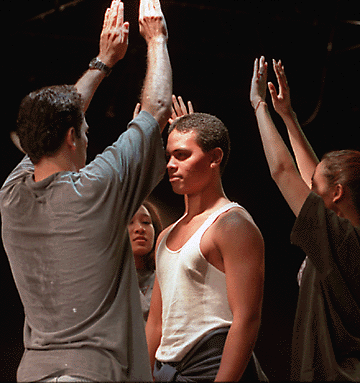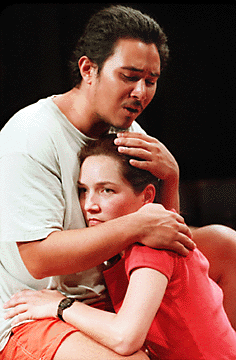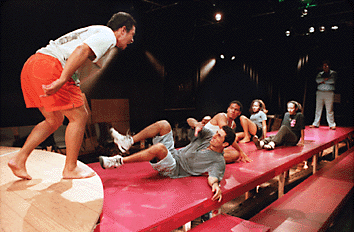


MELE
Hawaiian language
By Nadine Kam
takes center stage
Features EditorTIMES change and so do attitudes. In 1975, playwright John Kneubuhl had the audacity to suggest that Hawaiians did not own their culture because they did not speak the language.
Radical, man. So radical that the play, "Mele Kanikau" -- one of the first to make wide use of the Hawaiian language -- never crossed over from paper to the stage. The title translates to "Song of Mourning" and was written as a lament about the passing of traditional Hawaiian culture.
Born of Samoan, English and German ancestry, Kneubuhl grew up in his Samoan grandmother's thatched hut until he was 13 years old. He was educated at Punahou and Yale and spent 20 years as a TV writer in Hollywood before moving to Hawaii in his search of home and identity, two themes that ran through much of his later work.
Kneubuhl passed away before "Mele Kanikau" could be produced, but the future hasn't been as dire as he predicted. The notion of a society in which every Hawaiian youth is fluent in the tongue of his ancestors, is rapidly becoming a reality, and now, 23 years after "Mele Kanikau" was written, the drama will finally be produced by Kumu Kahua.

In those 23 years, we've watched Hawaiian immersion schools take root and we've witnessed the integration of language studies with other aspects of the culture, such as the dance. We are discovering new information about Hawaiian attitudes toward the monarchy's overthrow in the words of the people, earlier locked away in documents written in the language few scholars could read.It is possible to believe that until now, "Mele Kanikau" could not have been staged anyway. Until the language came naturally, there may have been few who could carry off the principal role of kumu hula.
"It's a really mystical, powerful, terrifying role for an actor and the guy playing the role, B.K. (Kalama) Cabigon is one of the rising stars in the Hawaiian language community," said director D. Scott Woods. It was Cabigon who was charged with updating the language for the piece.
"The kumu hula is a drinker. He does everything that is not accepted by society," said Woods, "But he turns out to be the only one who knows what it means to be Hawaiian."
The backdrop for the play is a Hawaiian pageant, resplendent with tourist-style kitsch of its time -- artificial flowers, projected rainbows and smiling hula girls. When the director of the pageant gets called away to Las Vegas, her replacement is a reclusive kumu hula, Noa Napo'oanaakala, who hates the slick production. His insistence on speaking Hawaiian increases the tension and resentment among the cast members.

"The people in the touristy pageant, who are portraying ali'i, are obviously not recognizing their culture, not recognizing the past, so they are dead. It was a wake-up call," Woods said."The kumu treats them in ways that seem disrespectful, but they need a shock to their system."
Woods arrived at "Mele Kanikau" as a mainland haole who "discovered it was the Hawaiian culture that spoke to my soul." After earning his bachelor of fine arts degree in directing from Carnegie Mellon University in Pittsburgh, Woods came to Hawaii three years ago, at first intending to study Asian theater.
Although he is only in his first semester of studying the Hawaiian language, his goal is to help create new Hawaiian language theater. In addition to teaching theater at the UH, he also works as a lighting designer for the all-Hawaiian- language theater company Ka Halau Hanakeaka (the makers of theater).
Woods, who says he is learning the language as he goes through the script, said those who do not speak the language should have no problem following a production whether it is in full or partial Hawaiian, as "Mele Kanikau."
"In Pittsburgh we put on multilingual productions. We speak the language of theater, which is universal. There are many ways to communicate in theater; you just gotta be good at it," Woods said.
"The only controversy comes from people who don't go to theater and people who feel they don't have to learn the language. Pretty soon, it's going to be all around and they're going to be left behind."
Mele Kanikau
A play by John Kneubuhl:
On stage: 8 p.m. Thursdays to Saturdays, except Thanksgiving Day, through Nov. 28; 2 p.m. Sundays through Dec. 6
Place: Kumu Kahua Theatre, 46 Merchant St.
Cost: $15 general, $12 for seniors and $10 for students and children Fridays to Sundays; $12, $10 and $5 for the respective groups on Thursdays
Call: 536-4441